10 Best High-Protein Meal Ingredients
10 Best High-Protein Meal Ingredients
Protein is arguably the most important macronutrient in your diet. While it’s often associated with bodybuilders and athletes, protein is an essential part of everyone’s diet. When you eat protein, it’s broken down into amino acids, which are the building blocks of our cells. Your body then uses them to build and repair tissues, produce enzymes and hormones, and support a healthy immune system. When we say protein is essential, we mean it.
However, incorporating enough protein into your daily meals, especially when you're juggling a busy schedule, can be a real challenge for many people. Whether you're a busy professional, a fitness enthusiast, or just someone looking to experience the benefits of a high-protein diet, meal delivery may be your best choice for achieving your health and fitness goals.
Let's dive into these ingredients and start your journey toward a healthier, protein-powered lifestyle.
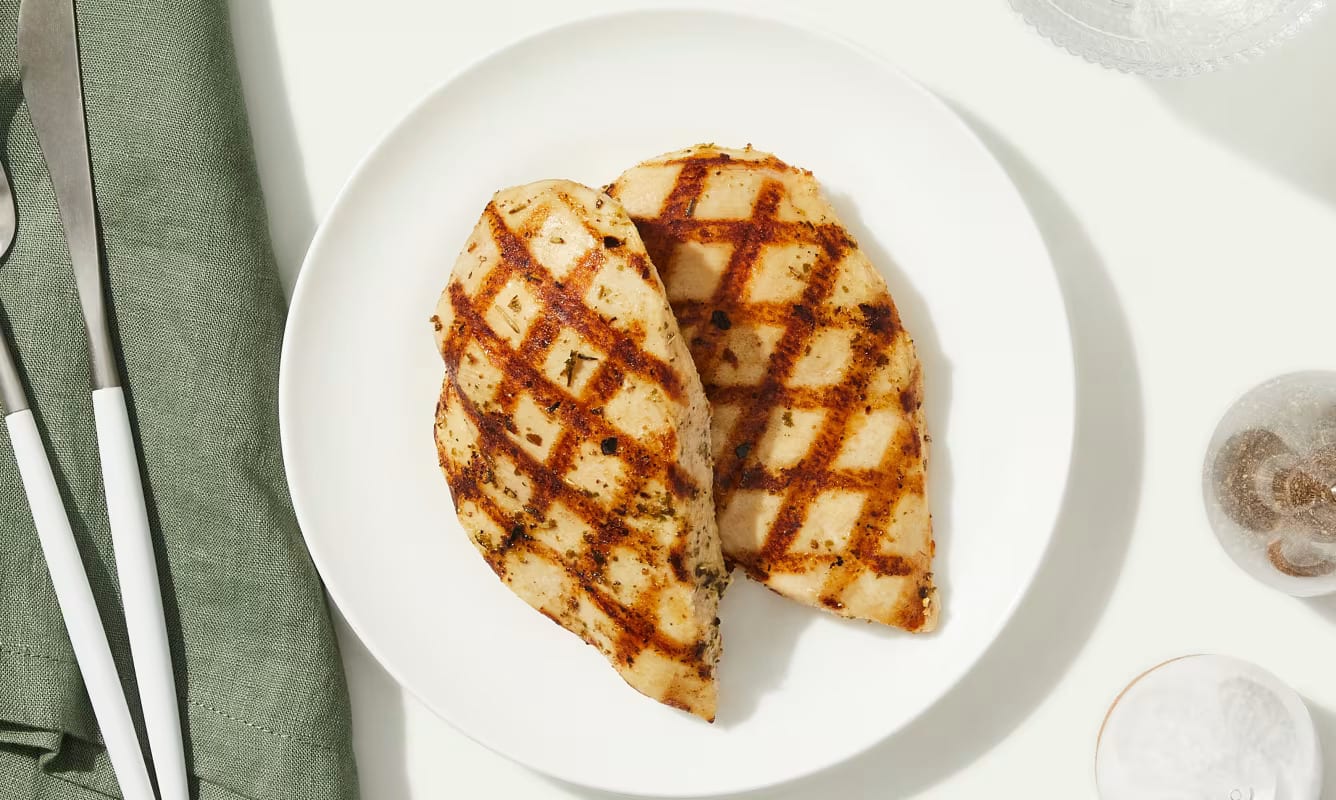
A 3.5-ounce serving of cooked chicken breast provides approximately 31 grams of protein.
Chicken is a highly versatile protein source in a variety of meals all around the world. From the classic roast chicken of Western cuisine to the spicy chicken curries of Indian cuisine and the chicken stir-fries of Asian cuisine, chicken's mild flavor and adaptable texture make it a universally beloved ingredient.
The high protein content helps support muscle growth and repair, which is essential for those engaging in regular physical activity.
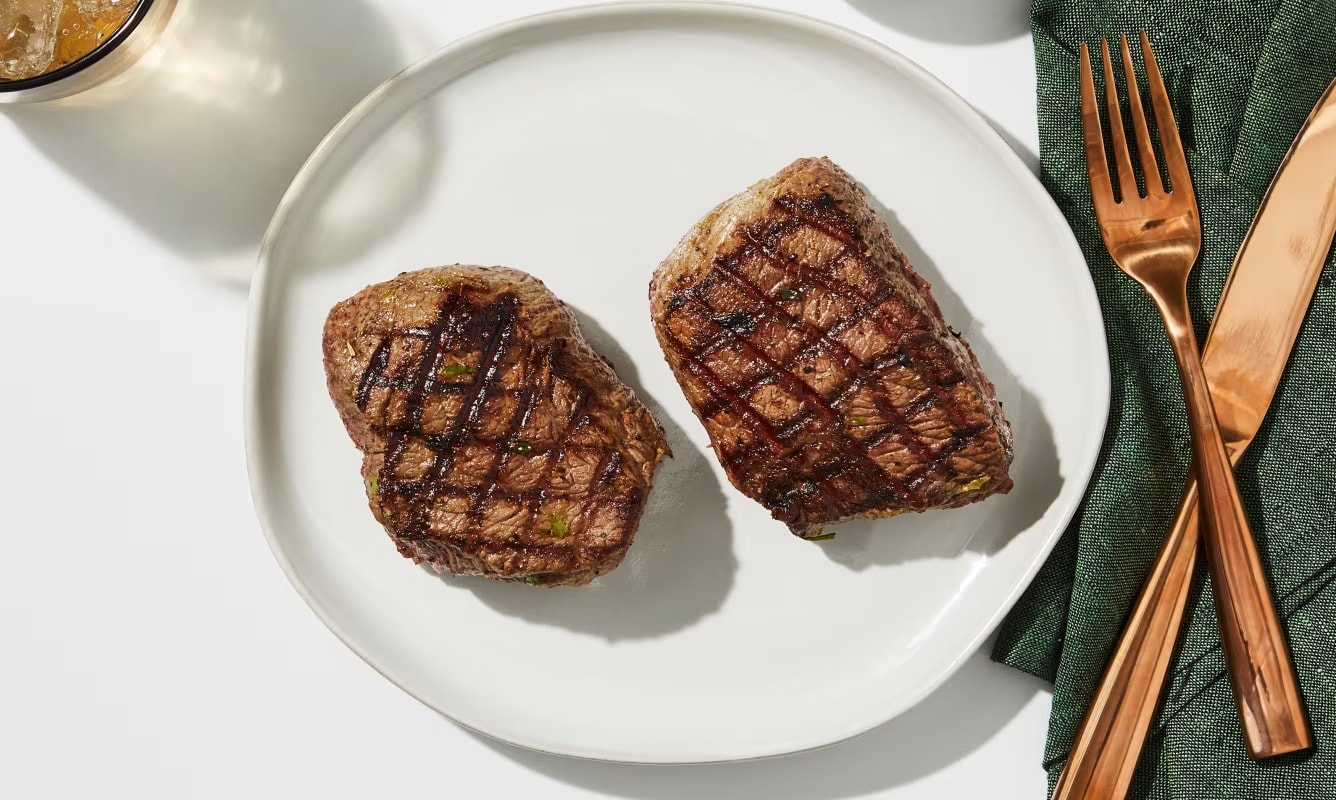
A 3.5-ounce serving of lean beef provides about 26 grams of protein..
Beef is celebrated worldwide for its rich, robust flavor and satisfying texture. It forms the backbone of many global dishes, from Ireland's hearty beef stews to Argentina's succulent steaks.
Beef is particularly rich in vitamin B12, which is essential for nerve function and the creation of red blood cells. However, it’s especially beneficial for muscle building and recovery. Not only does beef contain a high amount of protein, but it also contains creatine and carnosine. These two compounds are known to support muscle performance.

A 3.5-ounce serving of cooked salmon delivers around 22 grams of protein.
Salmon is renowned for its luxuriously rich flavor and tender, flaky consistency. As a fixture in diverse cuisines worldwide, it's savored in forms from the smoked variety in Scandinavian dishes to the raw, fresh slices in Japanese sashimi.
Salmon is rich in vitamin D, which can bolster bone health and encourage muscle development. Additionally, the omega-3 fatty acids abundant in salmon are instrumental in supporting cardiovascular health, reinforcing salmon's role as an essential component of a well-rounded diet.

A 3.5-ounce serving of cooked lean pork provides approximately 25 grams of protein.
Whether it's the succulent pulled pork at American barbecues, the hearty pork sausages in German fare, or the sweet and savory char siu in Chinese cuisine, pork's distinctive flavor and adaptability make it a fundamental ingredient across diverse dishes.
The ample protein content of pork supports your muscles, while its significant thiamine content fosters energy production, supporting overall vitality. Also, the selenium in pork facilitates efficient thyroid function, a crucial factor for maintaining a robust metabolism.

A 3.5-ounce serving of cooked turkey breast delivers around 30 grams of protein.
Turkey is lauded for its lean quality and is a favored choice in many meals, from the traditional Thanksgiving feast to the humble sandwich and salad. Turkey's lean nature makes it an excellent choice for those seeking high-quality protein without the high fat content typically associated with other meats.

A 3.5-ounce serving of firm tofu contains around 8 grams of protein
Tofu is a versatile ingredient that takes center stage in many plant-based meals. Its mild flavor and adaptable texture make it a favored choice in a medley of dishes, from vibrant stir-fries and comforting soups to nourishing smoothies and inventive desserts.
The high calcium content of tofu helps fortify bone health, while its iron content aids in energy production. This makes tofu a highly nutritious addition to any diet, particularly for those embracing a plant-based lifestyle.
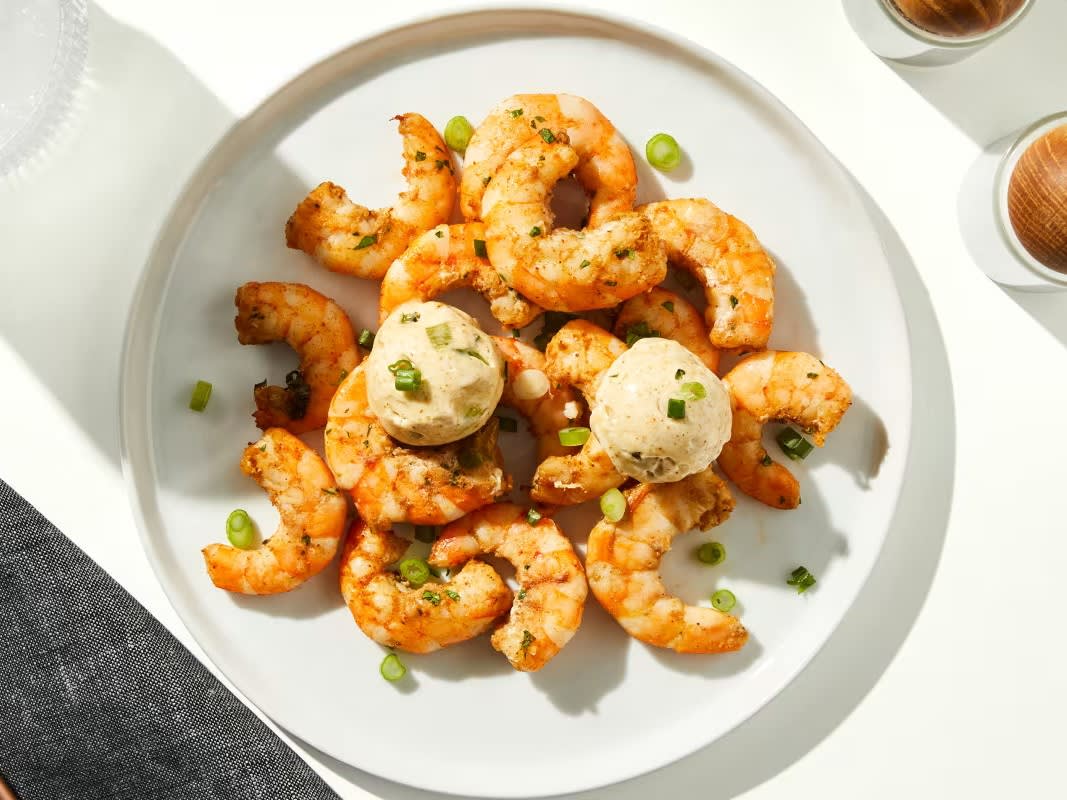
A 3.5-ounce serving of cooked shrimp offers about 24 grams of protein.
Shrimp, with its unique, slightly sweet flavor and firm, satisfying texture, is a cherished ingredient in many global cuisines. From the hearty shrimp gumbo of Southern American cooking to the spicy prawn curries of Indian cuisine, shrimp's distinctive taste lends a delightful edge to a variety of dishes.
Eating shrimp can support your nerve function due to its vitamin B12 content. Its high phosphorus levels enhance bone health. Additionally, shrimp is low in calories and fat, making it an excellent choice for those managing their weight or pursuing a lean protein diet.

A 1-ounce serving of cheddar or mozzarella has 7g protein, feta has 4g protein and blue cheese has 6gs protein.
A 1-cup serving of low-fat cottage cheese provides a whopping 28 grams of protein.
Cheese is a remarkably diverse food, with hundreds of varieties gracing tables worldwide. From the creamy, decadent brie of France to the robust, sharp cheddar of England, cheeses offer a spectrum of textures and flavors that can elevate any meal.
While cheese doesn’t have the same protein content as other options on this list, it can provide enough to ensure you’re reaching your recommended daily value.

A single large egg contains about 6 grams of protein.
The versatility of eggs is quite impressive; they're a key component in a wide array of both sweet and savory dishes. From the breakfast table featuring fluffy omelets and robust frittatas to the dessert tray adorned with moist cakes and silky custards, eggs are a foundational ingredient in countless recipes across various cuisines.
In addition to their protein content, eggs are a rich source of choline, a nutrient instrumental in supporting brain health and cognitive function. They also contain the antioxidants lutein and zeaxanthin, which are known to promote eye health and help protect against age-related macular degeneration.

A one-cup serving of cooked quinoa provides about 8 grams of protein.
Quinoa, with its slightly nutty flavor and pleasing, chewy texture, adds a unique touch to a variety of meals. Whether it's mixed into vibrant salads, used as the base for nutrient-packed bowls, or served as a hearty side dish, quinoa brings both flavor and nutrition to the table.
Beyond its protein content, quinoa boasts a high fiber content that supports digestive health, aids in weight management, and helps control blood sugar levels. Its rich magnesium content plays a crucial role in numerous bodily functions, including muscle function, heart rhythm, and blood sugar control.
How Does Factor Use These Ingredients in Their Meals?
Our expert team of culinary artists is proud to offer a wide variety of meals designed to support all kinds of different lifestyles.
Here are just a few examples of our meals that prominently feature some of these ingredients:
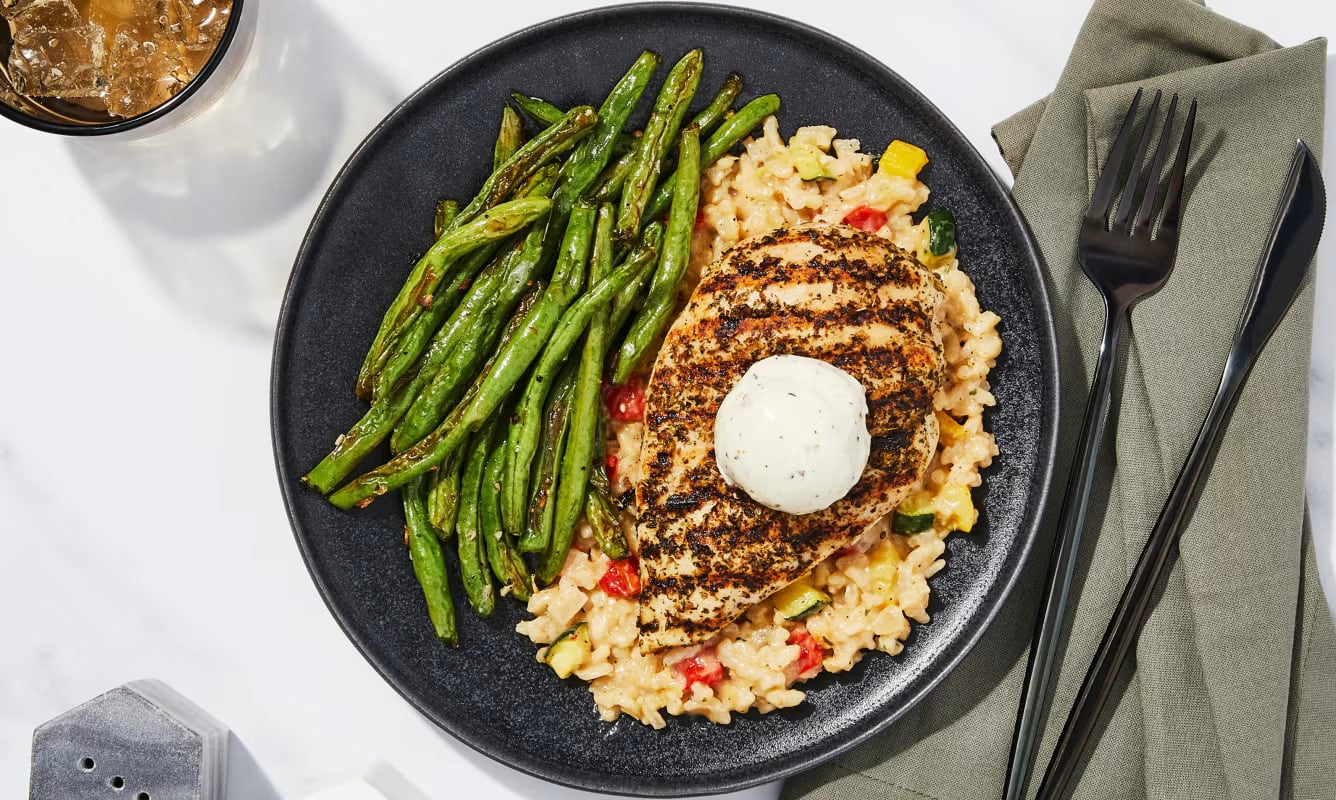
1. Italian Herb Chicken
Experience a slice of Northern Italy with our Tuscan-style Italian Herb Chicken. A succulent chicken breast, marinated in a blend of Italian herbs, is flame-grilled to perfection and served alongside creamy Arborio risotto. The risotto is slow-cooked with fresh vegetables and a splash of white wine, resulting in a dish that oozes comfort. The meal is completed with a generous helping of roasted green beans.
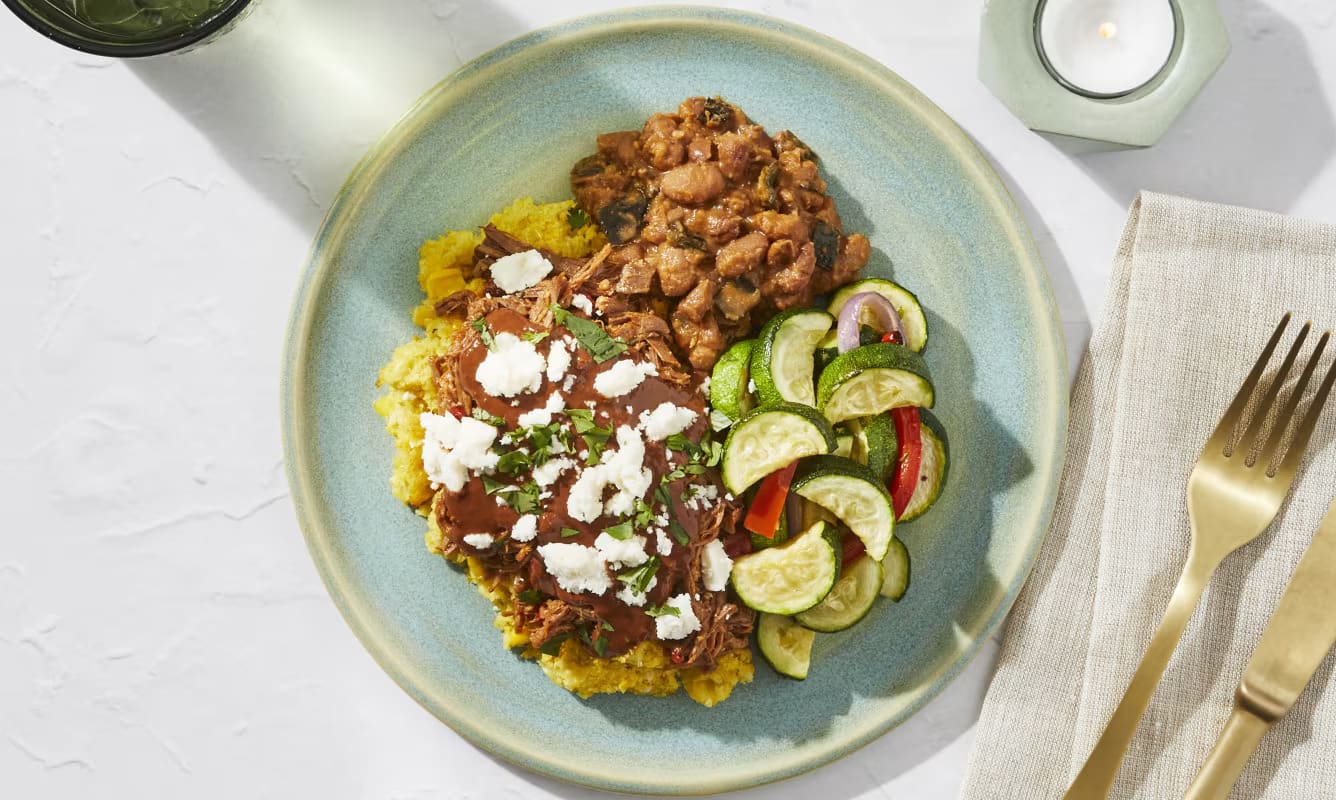
2. Mole Negro Shredded Beef
Dive deep in the rich flavors of Mexico with our mole negro shredded beef. The tender beef is slow-cooked in a smoky sauce made from dried chilies, spices, and a hint of cocoa. It's a Mexican fiesta in a bowl, served over a hearty masa tamale cake and garnished with cilantro and queso fresco. The beef is accompanied by pinto beans, roasted poblano peppers, and a vibrant mix of zucchini and red bell peppers.
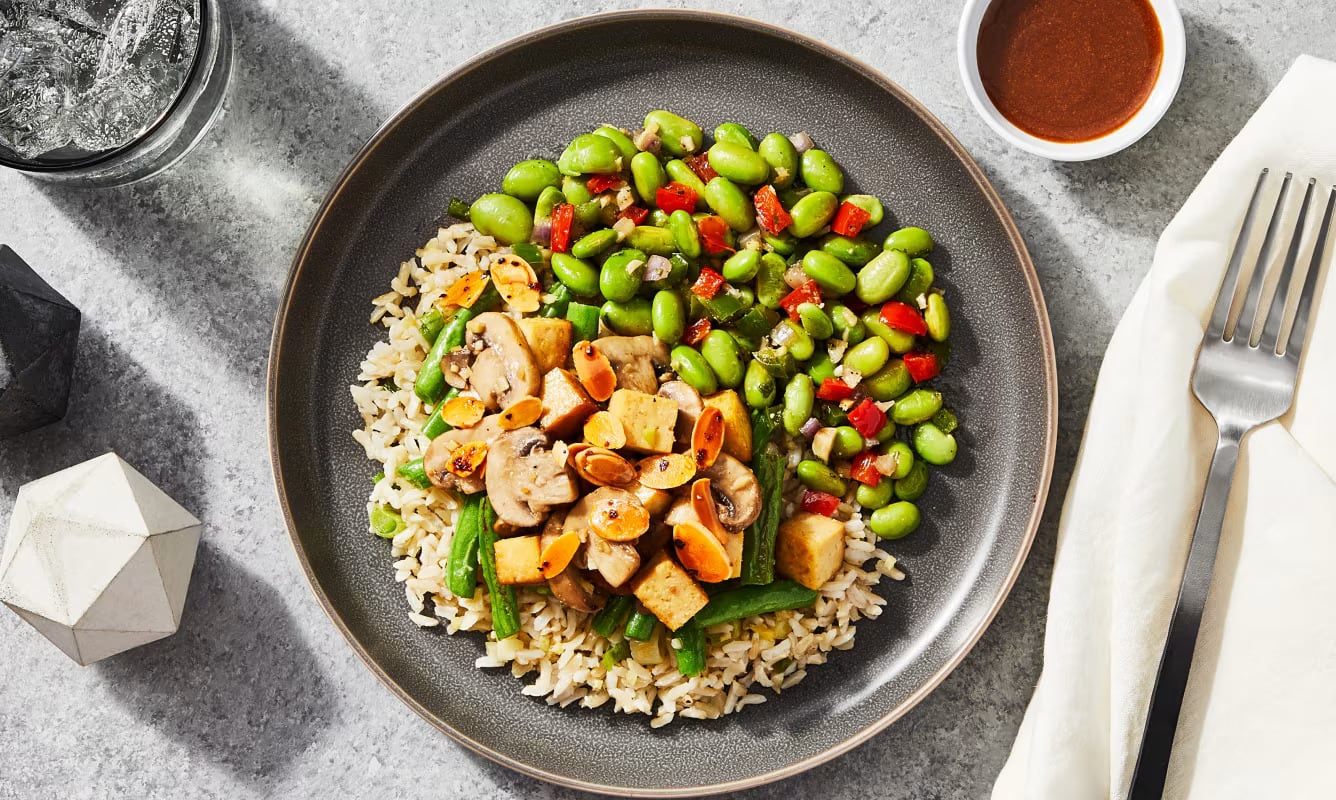
3. Smoked Tofu Almond Stir-Fry
Each mouthful of this Asian-inspired plant-based main dish offers layers of irresistible taste and texture. Soft brown basmati rice holds gingery, garlic-braised mushrooms, sesame-roasted green beans, and smoked five-spice tofu. A sprinkle of crunchy, ginger-chili toasted almonds tops it all. On the side, enjoy a vibrant, sesame-infused succotash of bell peppers and edamame. A drizzle of soy vinaigrette with agave binds the flavors together beautifully.